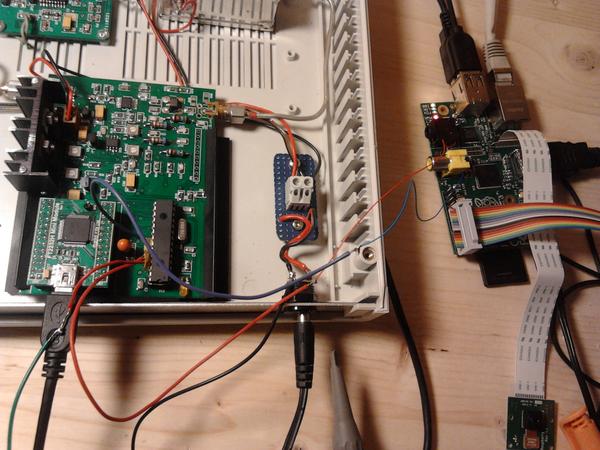Several projects have been developped since the first pionneer (F4DAY) described a very simple QSPK modulator. Projects like Digilite, Digilite ZL, F1DOJ, F8FAU and now DatvExpress are more and more robust. In this paper I don't speak about commercial (SR-SYSTEM, Hides and other professionals modulator).
All these projects required a PC (and a add-on card for capturing video) : it process the video for encoding (MPEG-2) and canal encoding (DVB-S QPSK based) for outputing IQ. PC has to send the IQ data to the main modulator : first by the parallel port and then more conveniently by USB port. Thus, a serializer is needed to get the data and put it with right timing to attack a quadature modulator.
Few mounths ago, I proposed to replace the PC with a Raspberry and its HD camera : such a litlle computer seems to be enough power to make the capture of video, encode it in H264 (more efficient encoder compare to MPEG-2) and canal coding outputing IQ to USB. This was tested with the Digilite modulator. At this time, it still require to have a serialiser (FTDI) and a dsPic for demuxing the incoming IQ Bytes data and set a stable clock.
Because most of the operating systems running on PC or Raspberry are multitasks, it is very hard to have a very stable output to feed logic components. That's why we generally use FIFO which works like a smoother of incoming data which are bursty.
I discover that the PWM output on the Raspberry could be used as a data serializer. By using DMA (Direct memory access), it ensures that the data are sent rugularly (strictly) and allows to send bit at very precise time (driven by the PLL clock of the Raspberry). Fortunatelly, there are 2 PWM output on Raspberry : this allows one stream of I and one stream of Q.
Plugging I/Q to a quadrature modulator like U2790 to go RF. A nyquist filter should be used to filter and ensure no harmonic. But that's all : you have a DATV modulator !
THE UGLY SOLUTION : No additionnal harware needed
In order to avoid quadrature modulator, we can think about generating the RF signal directly. But generate a 1,2GHz waveform modulated in QPSK is not even possible using such a little CPU. However, Raspberry can generate a 250 MHZ square tone. We can also update it and then by divide by 4 to have 4 phases, we can generate a 62,5 Mhz. With DMA we can update to have a relatively good timing for changes the phase.
As the signal is a a square, it produce a lot of harmonics and we can still have a good level (enough for a DVB-S receiver) at 1,0625 GHz ! Some errors happen because of not so good timing, but Reed Salomon correct them hopefully.
Ugly to be clean :
We could think about filtering after 62,5 Mhz to remove all harmonics and plug a mixer to upconvert to VHF (method described on the F4DAY website).
To be continued…
73's Evariste F5OEO

 Home
Home